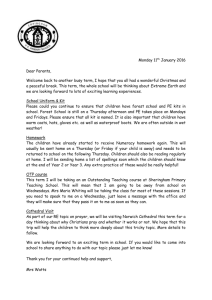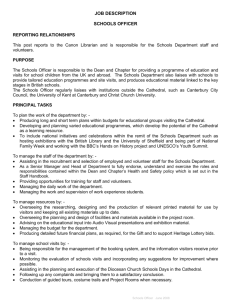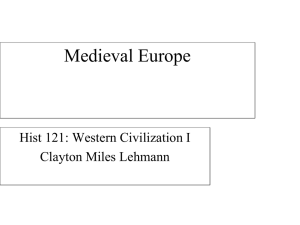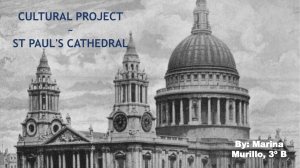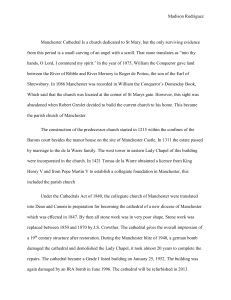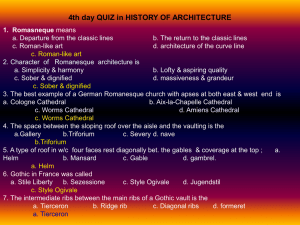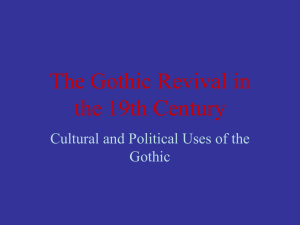Organ Scholar / King`s School Assistant Organist
advertisement
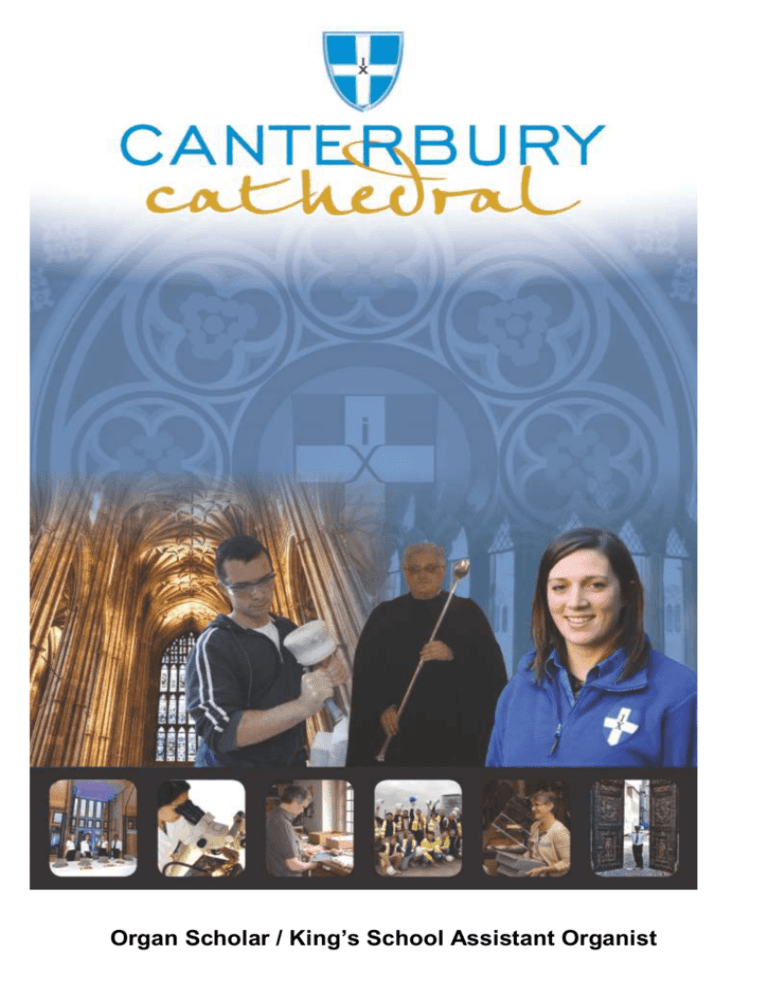
Organ Scholar / King’s School Assistant Organist 1 PROFILE OF CANTERBURY CATHEDRAL St Augustine, the first Archbishop of Canterbury, arrived on the coast of Kent as a missionary to England in 597 AD. He came from Rome, sent by Pope Gregory the Great. It is said that Gregory had been struck by the beauty of Angle slaves he saw for sale in the city market and dispatched Augustine and some monks to convert them to Christianity. Augustine was given a church at Canterbury (St Martin’s, after St Martin of Tours, still standing today) by the local King, Ethelbert whose Queen, Bertha, a French Princess, was already a Christian. This building had been a place of worship during the Roman occupation of Britain and is the oldest church in England still in use. Augustine had been consecrated a bishop in France and was later made an archbishop by the Pope. He established his seat within the Roman city walls (the word cathedral is derived from the Latin word for a chair ‘cathedra’, which is itself taken from the Greek ‘kathedra’ meaning seat.) and built the first cathedral there, becoming the first Archbishop of Canterbury. Since that time, there has been a community around the Cathedral offering daily prayer to God; this community is arguably the oldest organisation in the English speaking world. The present Archbishop, The Most Revd Justin Welby, is 105th in the line of succession from Augustine. Augustine’s original building lies beneath the floor of the nave– it was extensively rebuilt and enlarged by the Saxons, and the Cathedral was rebuilt completely by the Normans in 1070 following a major fire. There have been many additions to the building over the last nine hundred years, but parts of the quire and some of the windows and their stained glass date from the 12th century. By 1077, Archbishop Lanfranc had rebuilt it as a Norman church, described as “nearly perfect”. A staircase and parts of the North Wall – in the area of the North West transept also called the Martyrdom – remain from that building. During the Second World War, the Precincts were heavily damaged by enemy action and the Cathedral’s Library was destroyed. Thankfully, the Cathedral itself was not seriously harmed, due to the bravery of the team of fire watchers, who patrolled the roofs and dealt with the incendiary bombs dropped by enemy bombers. Today, the Cathedral stands as a place where prayer to God has been offered daily for over 1,400 years; nearly 2,000 services are held each year, as well as countless private prayers from individuals. The Cathedral offers a warm welcome to all visitors – its aim is to show people Jesus, which we do through the splendour of the building as well as the beauty of the worship. PRIVATE AND CONFIDENTIAL – September 2013 2 THE WORK OF THE CATHEDRAL The work of the Cathedral is carried out by over 300 paid staff, supported by some 500 volunteers. The ‘corporate body’ responsible for the management of the Cathedral is the Chapter of Canterbury who are advised by the Cathedral Council and the College of Canons. The Chapter of Canterbury The Chapter are responsible for all aspects of the day-to-day management of the Cathedral. Chapter comprises the Dean, the Residentiary Canons, the Receiver General and four additional persons appointed by the Archbishop. The Cathedral Council The Council represents the Cathedral community as well as the wider local and regional community. It has 20 members, drawn from a wide variety of organisations. Its duty is to further and support the work of the Cathedral Church in spiritual, pastoral, evangelistic, social and ecumenical areas. The College of Canons The College of Canons is composed of 30 Honorary, Lay and Provincial Canons, appointed by the Archbishop and it supports the life of the Cathedral in many different ways. The Cathedral Trust The Cathedral Trust is a separate charity that is solely for the benefit of the Cathedral. Since 1974, it has assisted with the restoration, maintenance and improvement of the fabric and contents of Canterbury Cathedral and the provision, promotion and encouragement of music The Cathedral is well-known all over the world and we welcome more than 1 million visitors and worshippers every year. The Cathedral is more than just a beautiful old building and heritage site; it is a working, living church which maintains a tradition of welcome and worship that has been practiced here for over 1400 years. Friends The Friends of Canterbury Cathedral was founded in 1927 by the distinguished scholar and poet Dean George Allen Kennedy Bell who later became Bishop of Chichester. The Organisation was the first of its kind in the world. The Friends are the Cathedral’s fan club. Admirers of the building, its history and its community, Friends are a part of the Cathedral and work together to preserve it forever, contributing financially - and directly – to many individual and vital projects. The Cathedral Shop The Canterbury Cathedral Shop is a large gift shop in the heart of the city of Canterbury. It has an impressive range of high quality gifts, mostly British, and their own exclusive award winning designs. The Shops wide range of merchandise includes replica historical artefacts, books and CD’s of the world-famous Canterbury Cathedral choir. PRIVATE AND CONFIDENTIAL – September 2013 3 Music & Liturgy Department Organist and Master of the Choristers Precentor Secretary to the Music and Liturgy Department Assistant Organist Organ Scholar Lay Clerks Minibus Driver Mistress of the Robes PRIVATE AND CONFIDENTIAL – September 2013 4 JOB PROFILE The Organ Scholar reports to the Organist and Master of the Choristers and in his absence the Assistant Organist of Canterbury Cathedral. In conjunction with, and for the duration of, the organ scholarship, the position holder will undertake the position of the King’s School Assistant Organist, this post reports to the King’s School’s Director of Music. To support the Organist and Master of Choristers and Assistant Organist of Canterbury Cathedral and share in the performance of music in the Cathedral and the King’s School, its preparation and administration, as decided with the Organist and Master of the Choristers and/or the King’s School’s Director of Music. PRINCIPAL TASKS To attend and play at such Cathedral services and rehearsals as shall be deemed necessary, in particular Evensong on Wednesdays and Thursdays. To deputise for the Organist and Master of the Choristers / Assistant Organist when requested. To play voluntaries before and after services as requested. To assist the other organist (as page-turner and registrant) and attend services, including special services, concerts and rehearsals, as required. To assist with the training of the junior choristers and provide some practice supervision in the Choir House. To assist with the training of the Girls’ Voluntary choir. To act as host and guide for visiting recitalists as required. To assist the Organist and Master of the Choristers / Assistant Organist and other Music & Liturgy staff with administrative duties. To work in a safe manner in accordance with the Health & Safety policy and rules of the Cathedral, and undergo any training necessary. To assist other Music & Liturgy Department staff when requested. To carry out other tasks as directed by the Dean and Chapter. The King’s School Assistant Organist will serve as Librarian to the Music Department and may be required to assist the Department Administrator with the efficient and smooth running of the Department. The King’s School Assistant Organist will be expected to support the musical activities of the King’s School where required by attending concerts and services, especially those which feature the school's choirs. The King’s School Assistant Organist will be expected to attend and play at such rehearsals, assemblies and services as required. Teaching (paid on an hourly basis) may be offered if the successful candidate is suitably qualified. In the event of the absence or the illness of either the Director of Music or the School Organist, the King’s School Assistant Organist may be required to play the organ or the piano for other school services, school assemblies, concerts or examinations. PRIVATE AND CONFIDENTIAL – September 2013 5 PERSON SPECIFICATION The personal specification below indicates the qualifications, experience, knowledge and skills required to undertake the role effectively. ESSENTIAL KNOWLEDGE AND SKILLS Talented organist. Understanding of and sympathy with the aims and purposes of the Cathedral, its mission and ministry. DESIRABLE KNOWLEDGE AND SKILLS A practicing communicant within the Anglican Communion. PERSONAL ATTRIBUTES Must be flexible in approach to hours worked. Self-motivating and able to work both independently and collaboratively with internal and external contacts and colleagues. Organised and self-disciplined. PRIVATE AND CONFIDENTIAL – September 2013 6 TERMS AND CONDITIONS Duration This contract is for a fixed term of 12 months. Salary The value of the scholarship is currently £3,738 per year. Extra fees are payable for weddings, funerals and some other non-statutory services, also for private teaching. Accommodation is provided free of rent, water rates, council tax, light and heat charges. An additional honorarium which is currently £ 2,260 per year will be paid by the King’s School in monthly instalments during term time. In addition, the King’s School Assistant Organist will be entitled to all school meals, without charge, during term time. Working hours The Organ Scholar attends such rehearsals and services as may be deemed necessary. As Organ Scholar you will be required regularly to accompany Evensong on Wednesdays and Thursdays and be available to accompany services during the absence of the Organist and Master of the Choristers or Assistant Organist of Canterbury Cathedral. The Sunday 6.30 service is regularly the Organ Scholar’s responsibility. It is also desirable for you to be in attendance over the principle liturgical Feasts (Christmas, Easter etc.). Regular duties at the King’s School will include playing the piano or organ for at least two school assemblies per week. In the event of the absence or the illness of either the Director of Music or the School Organist, the King’s School Assistant Organist may be required to play the organ or the piano for other school services, school assemblies, concerts and examinations. Annual holiday Holiday to be taken in line with the Cathedral Choir academic holidays: 31 consecutive days in Summer or early Autumn. 11 consecutive days after Christmas. 12 consecutive days after Easter (including one weekend), except on the rare occasions when Easter falls very late, when the holiday will be split before Palm Sunday and after Easter Day. Absence for professional engagements is by arrangement with the Organist and Master of Choristers. The calendar of services should always be borne carefully in mind. Training Training needs are assessed continuously and appropriate on the job training is provided. Pension scheme The Dean and Chapter offer a Stakeholder pension to all employees. Your age and salary will determine if you are to be automatically enrolled into the pension scheme. The Dean and Chapter contribute 7½ % of salary into a Stakeholder Pension Scheme. Staff in the pension scheme are insured against death in service 3 x annual salary to the age of 70. Staff benefits PRIVATE AND CONFIDENTIAL – September 2013 7 We are able to offer a range of staff benefits including discounts in local shops, restaurants and sports centres. Additional Requirements: Before a formal offer of employment can be made, the applicant will be required to: have a satisfactory enhanced disclosure from the Disclosure and Barring Service. This position is exempt from the provision of Section 4(2) of the Rehabilitation of Offenders Act 1974 by virtue of the Rehabilitation of Offenders Act 1974 (Exceptions) Order 1975. The grounds on which it is exempt are that in the normal course of your duties you will have access to persons under the age of 18, and that your normal duties will be carried out wholly or partly on the same premises where the provision of training to persons under 18 takes place. Applicants are therefore not entitled to withhold information about convictions which for other purposes are “spent”. The DBS Code of Practice is available on request, alternatively you can obtain it from the DBS website www.homeoffice.gov.uk/dbs EQUALITY STATEMENT The Dean and Chapter recognises that discrimination and victimisation is unacceptable and that it is in the interests of the organisation and its employees to utilise the skills of the total workforce. It is the aim of the organisation is to ensure that no employee or job applicant receives less favourable facilities or treatment (either directly or indirectly) in recruitment or employment on grounds of age, disability, gender / gender reassignment, marriage / civil partnership, pregnancy / maternity, race, religion or belief, sex, or sexual orientation. This job description is provided to assist the post holder to know their principal duties. It may be amended from time to time in consultation with you, by, or on behalf of, the Head of the Department, without change to the level of responsibility appropriate to the grading of the post. HOW TO APPLY Applications should be submitted using the Cathedral application form, and all sections must be completed. If you wish you may attach a copy of your CV to support your application. Application forms can be found on our web pages at: http://canterbury-cathedral.org/community/employment/vacancies/ Your completed form can be submitted on line or returned to: recruitment@canterbury-cathedral.org The closing date for this post is: Interviews are expected to be held: Friday 14th November 2014 Monday 24th November 2014 It is our practice to advise all applicants of the outcome of their application at all stages in the process. PRIVATE AND CONFIDENTIAL – September 2013
